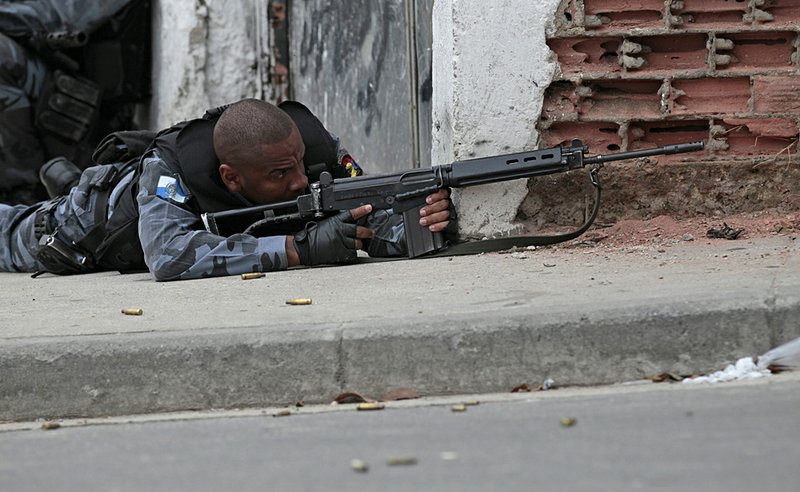RIO DE JANEIRO, Brazil — Brazilian soldiers and police exchanged gunfire with druggang members holed up in a slum complex Friday and stood their ground, trapping the traffickers inside.
About 800 troops are supporting a police offensive at the Alemao complex of shantytowns, an operation that came just a day after police took control of a nearby slum that also had been a gang stronghold.
Authorities are not publicizing their plans, but it appears an invasion of Alemao, one of Rio’s most dangerous slums, was imminent.
“This is not the moment to circumvent risks, but rather to confront risks,” said Brazilian Defense Minister Nelson Jobim, who traveled to Rio to meet with the state’s governor and top security officials.
Military spokesman Enio Zanan said soldiers had been taking fire from drug-gang members hiding in the large complex. He earlier said the troops were not returning fire, saying it would endanger “innocent people in the community.”
Television footage, however, showed at least one soldier firing on the slum, and the newspaper O Globo reported heavy exchanges of gunfire between troops and drug-gang members.
Zanan did not return calls for comment Friday night. A man who answered the phone at the army’s western Rio headquarters said he could not confirm the involvement of troops in the fighting.
Zanan earlier said the confrontation had no set time or date to end and the troops were ready to stand constant guard as long as needed.
Among those wounded Friday was the chief Brazil photographer for the Reuters news agency, Paulo Whitaker. Reuters said he suffered a bullet wound in the shoulder that was not life-threatening. The source of the shot was not immediately clear.
Federal and state police officers, meanwhile, conducted door-to-door searches and patrols within the Vila Cruzeiro slum near Alemao. The area was taken by officers Thursday afternoon during a fivehour operation using armored vehicles and assault rifles.
After police armored cars had their tires blown out by gangs or were stymied by burning tires, police relied on military armored personnel carriers equipped with caterpillar treads to roll over or push aside barriers and enter the fortified shantytown.
Officials trumpeted their victory Friday, saying it was a sign of a new Rio.
The governor of Rio state, Sergio Cabral, said the moment was historic for proving that no part of Rio was beyond the reach of the law and for the unprecedented cooperation of the armed forces with police to deliver peace to Rio.
“We have demonstrated to those who don’t respect the law ... the pre-eminence of a democratic state governed by the law,” he said. “Bringing peace to this population makes this a very important day for Rio.”
Jobim called the unprecedented cooperation of the armed forces a “change in paradigm” that would assure “peace and the exercise of human rights” in Rio de Janeiro.
Slum residents, streaming out down steep, narrow alleys to jobs in the city below, had mixed reactions as officersapproached them. Some ran away, and others stayed to welcome them and cooperate by showing their identification papers.
Marcilio Alves, treasurer of the residents association of Chatuba, one of the slums in the Alemao complex of shantytowns, and whose son and ex-wife live in nearby Vila Cruzeiro, said people were trying get back to their routines Friday.
But the community remained without electricity, as utility workers were afraid of going up the hillside to repair wiring damaged during the incursion. Residents were also nervous because the police force’s hold on the area was still seen as tenuous, and they were afraid that cooperating with law enforcement officials or talking to news media would brand them as snitches if the gangs returned, Alves said.
More than 80 abandoned motorcycles and at least one body were found during the search Friday morning, reminders of the gang’s quick retreat the day before to the Alemao complex - among the best-defended gang turf in the city.
Nearly 200 people have been arrested or detained since the start of the widespread violence Sunday, said police spokesman Henrique de Lima Castro Saraiva. More than 96 buses and cars were burned on major roadways, many motorists robbed and police outposts shot in the city that will host the final match of the 2014 World Cup as well as the 2016 Olympics.
It is unclear how many people died in Thursday’s violence, but police said at least 28 have been killed since Sunday. Three police officers have been injured so far.
Information for this article was contributed by Bradley Brooks, Cristian Salazar and Flora Charner of The Associated Press.
Front Section, Pages 7 on 11/27/2010
